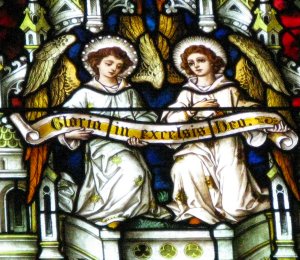
 ANGER SCENES ever since St. Francis of Assisi have successfully led the faithful to deeper mediation on the great mystery of the Incarnation. Most nativity scenes are static displays, though, so they can’t replicate the smells, the cold, or the crying of the Bethlehem stable. Another feature of the moment that nativity scenes rarely capture is the music. Yet, that stable and its environs were a very musical scene.
ANGER SCENES ever since St. Francis of Assisi have successfully led the faithful to deeper mediation on the great mystery of the Incarnation. Most nativity scenes are static displays, though, so they can’t replicate the smells, the cold, or the crying of the Bethlehem stable. Another feature of the moment that nativity scenes rarely capture is the music. Yet, that stable and its environs were a very musical scene.
Think about the song of the “multitude of the heavenly host” (Luke 2:13) for a moment: “Glory to God in the highest, and on Earth peace to people of good will” (Luke 2:14). It’s like a one-two punch, a cause-and-effect, a natural progression. When we give glory to God, we receive His peace as a result. It is a simple formula, but one that so often goes untried. In our small-mindedness and short-sightedness, we fail to understand that the highest privilege we have as humans is to give glory to God. When we engage in divine worship, we are actually reaching our fullest potential. Said another way, we are most human in the moments we spend glorifying God.
So why do we spend so much time glorifying other things? Our world tells us to glorify all kinds of stupid things, like Xbox & iPhones & gift cards. Crazy news coverage almost forces us to glorify singers & actresses & athletes. I think it’s reasonable to say, though, that the primary trouble for most of us is not glorifying material possessions or celebrities. They are part of the equation, but the primary trouble is probably the time we spend glorifying ourselves. We fall into the habit of putting our own needs and wants before those of others. We worry about what other people think about us and fixate on preserving our reputation. We go out of our way to gain the praise & adulation of our family & friends & strangers.
Glorifying material possessions or celebrities or ourselves is simply a waste of time and energy. If our focus is only on those things, we’ll never be at peace. Only God brings us peace. Jesus is the very Prince of Peace, and when we give Him the gift of ourselves, we receive the reciprocal gift of His peace.
The angels who sang to the shepherds of Bethlehem had it right, and we’ve been getting it wrong ever since. We could all use a little more peace in our lives, so why not give their simple formula a try? It’s a truism that holds in every age and in every place. If we give glory to God in the highest, all the rest of our lives will fall into right order, and we will be blessed with peace.
